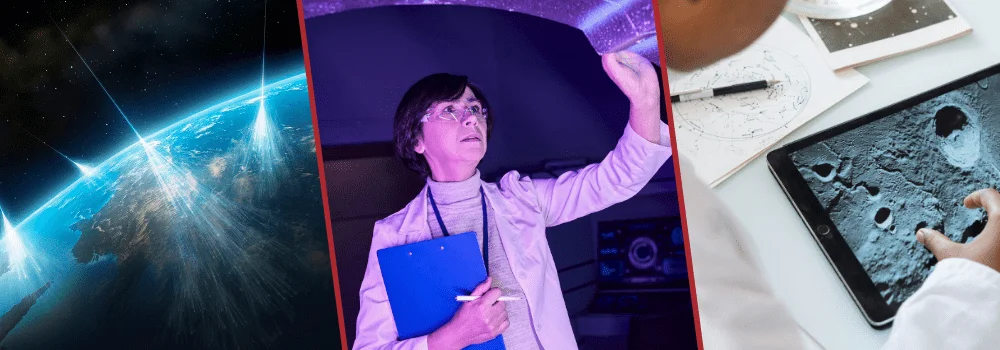How to Become an Astrophysicist?
Unveiling the Path to Becoming an Astrophysicist: Your Guide to Stars and Beyond

In this Career Outline

Introduction to Astrophysicist
"Astrophysics reveals that we are all part of a much larger and more complex reality than we might have imagined." – Stephen Hawking
Astrophysicists are physicists who study the cosmos, using telescopic sightings and data from space missions. They aim to understand how the universe operates by analyzing celestial bodies and reconciling physics with astronomical observations. Most astrophysics research is conducted by universities and agencies like NASA, with astrophysicists often serving as professors who train students and conduct research. They gather data from observatories and satellites, typically spending a few months collecting information and the rest of the year analyzing it. Theoretical astrophysicists, however, do not conduct experiments. Their research is published in scholarly journals.
Steps to Become an Astrophysicist:
Step-1
Focus on Mathematics and Physics to build a strong foundation.
Step-2
Obtain a degree in Physics, Astronomy, or Astrophysics for fundamental knowledge.
Step-3
Gain practical skills through internships or research programs during undergraduate studies.
Step-4
Consider pursuing a Master’s degree for specialized knowledge and skills.
Step-5
Complete a Ph.D. program to conduct original research and advance in the field.
Step-6
Join scientific organizations, attend conferences, and network with peers.
Step-7
Explore opportunities in research institutions, academia, or government space agencies for impactful roles.
Eligibility Criteria
| Eligibility Criteria | Description |
|---|---|
| Eligibility | Completion of 10+2 with Mathematics and Science as compulsory subjects |
| Educational Background | 12th grade: 50%+ from accredited board. |
| Undergraduate Degree | Bachelor's degree in Physics, Astronomy, Astrophysics, or a related discipline. |
| Postgraduate Degree | Master’s degree in Astrophysics or a related field (optional, but advantageous), Ph.D. in Astrophysics or related field |
| Entrance Exams | Some may require entrance exams specific to astrophysics or related programs |
- Completion of 10+2 with Mathematics and Science as compulsory subjects.
- A Bachelor's degree in Physics, Astronomy, Astrophysics, or a related field is essential.
- Optional, but advantageous to pursue a Master’s degree in Astrophysics or a related field.
- Typically required for advanced research positions and academic roles in Astrophysics or a related discipline.
- Some colleges may require Entrance exams after 12th specific to astrophysics or related programs.

Not eligible to pursue this career?
Find out different career options based on your current academic accomplishments. Enquire with our career experts and build a roadmap to your career success!
Tasks to perform as an Astrophysicist:
Knowledge & Skills Required
Astrophysicists need a diverse skill set to succeed in their roles. Here are the key knowledge areas and skills needed to excel in this field:
| Knowledge Required | |
|---|---|
| Proficiency in calculus, differential equations, linear algebra, and numerical methods | Knowledge of Maxwell's equations, electromagnetic waves, and radiation |
| Concepts of thermodynamic processes, kinetic theory, and statistical mechanics | |
| Study of the formation, structure, and lifecycle of stars | Understanding the principles of quantum theory, wave-particle duality, and quantum states. |
| Skills Required | |
|---|---|
| Mathematical Proficiency | Computer Programming |
| Physics Knowledge | Observational Skills |
| Critical Thinking | Teamwork and Collaboration |
| Data Analysis | Adaptability |
Understanding What are soft skills? and why is it important, as they complement technical abilities and enhance overall performance in the field of astrophysics.

The Knowlegde and Skills don't intrigue you?
Your career may not align with your interests. Identify them and match with careers requiring those skills for faster growth and success!
Job roles offered for an Astrophysicist:
Once you attain the qualifications to become an astrophysicist, numerous career paths open up. These include:
Researching celestial bodies and phenomena, with specializations in solar science, cosmology, or interstellar astrophysics.
Exploring the potential for life on other planets and studying its origins and possible habitats.
Leading teams in research and development projects, overseeing operations, and communicating project outcomes.
Participating in space missions, conducting experiments in microgravity environments, and advancing space exploration.
Studying climate patterns, conducting field experiments, analyzing data, and advising on environmental strategies and policies.

Not sure where you fit in?
With countless career options, choosing the right path can be tough. Analysis and guidance sessions help clarify what to study, pursue, and achieve.
Career Opportunities for an Astrophysicist:
Astrophysicist can opt for various fields of work in the companies listed below:
| Broward College | Indian Institute of Astrophysics, Bangalore | Ashoka University |
| Universitat Frankfurt | Indian Space Research Organization | Tata Institute of Fundamental Research |
| Defense Research and Development Organization | Space Applications Centre | Satish Dhawan Space Centre |
| Vikram Sarabhai Space Centre |
Colleges offering courses in Astrophysicists :
Here is the list of colleges offering the Best courses after 12th:
| Indian Institute of Astrophysics, Bangalore | Indian Institute of Science Education and Research |
| Indian Institute of Space Science and Technology, Thiruvananthapuram | National Centre for Radio Astronomy, Pune |
| Raman Research Institute, Bangalore | Tata Institute of Fundamental Research, Mumbai |
| University of Delhi, New Delhi | Indian Institute of Technology, Bombay |
| Indian Institute of Technology, Kharagpur | Andhra University, Visakhapatnam |
End Note
The path to become an astrophysicist is filled with wonder and discovery. With the right education and skills, you can explore the universe and contribute to our understanding of the cosmos. Connect with our experts at SetMyCareer for Career counselling and guidance to help you along your career goals and start your stellar journey today!
In this Career Outline
You don't fit in as an Astrophysicist?
Find out your best suitable career by booking an appointment with our experts
Book nowGet In Touch
No. 14/595, 1st Floor, Nanjappa Reddy Layout, Koramangala 8th Block, Bangalore 560095





